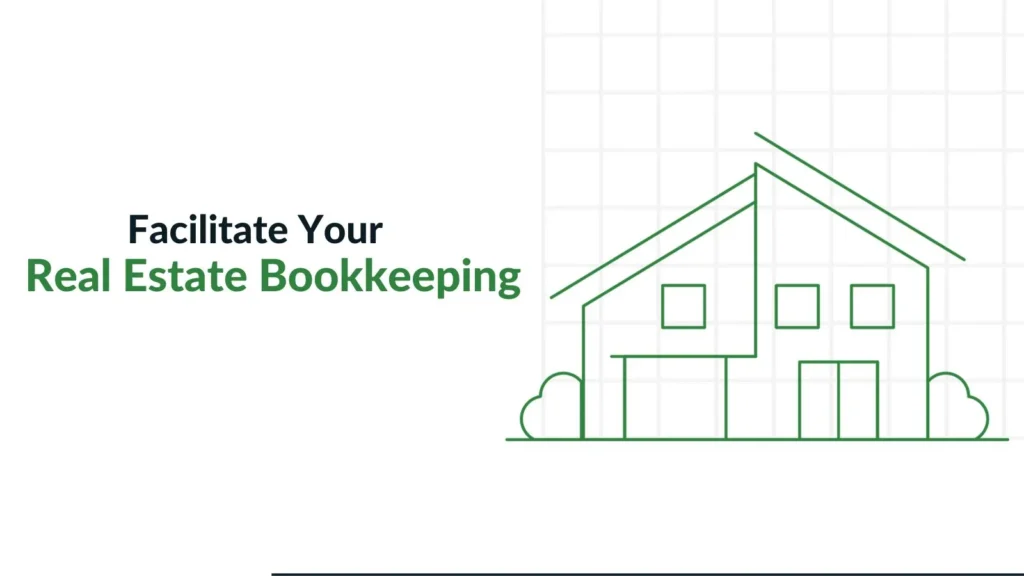Real estate bookkeeping refers to the process of recording, organizing, and managing the financial transactions related to real estate properties. It involves tracking property income and expenses, recording property acquisitions and sales, managing mortgages and loans, calculating property depreciation, handling day-to-day operating expenses, and ensuring accurate tax records. Proper bookkeeping plays an important role in a real estate business as it ensures transparency to stakeholders. Due to its complexities, many professionals use specialized software or hire experts in the field.
Key Takeaways:
- Effective real estate bookkeeping provides a clear financial overview of your assets, enabling informed decisions.
- Retain all papers related to property transactions for at least 7 years as recommended by the IRS.
- Distinguish between interest (recorded as an expense) and principal (reduces the loan balance) when managing mortgages.
- Avoid common bookkeeping mistakes to maintain financial health and compliance.
- Utilize specialized bookkeeping solutions tailored for real estate professionals.
Why Bookkeeping is Important in Real Estate
Bookkeeping is crucial in real estate for several reasons:
- Asset Management: Real estate is a long-term investment, and good bookkeeping allows you to track the appreciation or depreciation of property values over time. This information is valuable for making strategic decisions about holding, selling, or reinvesting in properties.
- Cash Flow Management: Real estate bookkeeping often involves cyclical cash flows, especially in rental properties where there are periods of vacancy. Proper bookkeeping helps in tracking cash inflows and outflows, ensuring that there’s enough liquidity to cover expenses.
- Property Management: If you own or manage multiple properties, good bookkeeping is essential for tracking income and expenses associated with each property. This allows you to assess the profitability of individual properties, make informed decisions regarding property improvements, and identify potential issues early on.
- Securing Financing: If a real estate investor or developer wants to secure financing or a loan, financial institutions will require detailed financial records to assess the viability of the investment.
- Legal Protection: Proper bookkeeping ensures that all transactions are transparent and traceable. In the case of legal disputes, having detailed financial records can be crucial evidence.
- Compliance with Tax and Regulations: Real estate investors must adhere to complex tax codes and regulations. Accurate bookkeeping ensures compliance and helps avoid costly penalties.
- Informed Decision-Making: By maintaining precise financial records, investors can make better decisions based on comprehensive data, enhancing their strategic planning.
- Ensuring Long-Term Success and Profitability: A well-structured bookkeeping system supports the business’s longevity by providing insights into financial health, enabling proactive management, and fostering sustainable growth.
What to Track in Real Estate Bookkeeping
Real estate bookkeeping and accounting are incredibly important in several contexts. Whether you sell small properties as a hobby or manage property services generating millions, maintaining accurate records is essential. Here’s what you should track:
Income From Commissions
Real estate agents generate income from property sales and commissions associated with each closed deal. Accurately tracking, monitoring, and reporting all incoming cash from these sources is vital. Use your accounting system to keep these numbers organized and easily accessible.
Association Fees and Expenses
Depending on your employment status, you may need to share a percentage of your commission with a brokerage or firm, which counts as an expense. Additionally, membership fees to associations and other national organizations can be considered deductions.
Real Estate License Costs
Maintaining a real estate license involves costs for renewals and continuing education classes. These should be recorded as necessary expenses and included in your annual costs.

Related Expenses
Track expenses such as property management fees, repairs & maintenance costs, travel, property taxes, insurance premiums, and mortgage interests. Monitoring these expenses helps improve cash flow and profitability.
Marketing Expenses
Marketing and advertising inform the community about your services. These expenses can include:
- Website design and development
- Social media management
- Print and newspaper advertisements
- Online and digital advertisements
- Business cards
- Event sponsorships
Financial Reports
Regularly review your financial reports, such as income statements, balance sheets, and cash flow statements. These reports provide insights into the financial health of your investments, enabling informed decisions, trend identification, and return maximization.

Common Bookkeeping Mistakes in Real Estate
Navigating the financial landscape of the real estate industry requires meticulous attention to detail. Here are some frequent pitfalls to watch out for:
- Inadequate Record Maintenance: Failing to document all transactions—even minor expenses—can lead to significant errors. Proper storage of receipts and maintaining backups of financial records are crucial to prevent data loss from system failures.
- Mixing Personal and Business Finances: Using the same accounts for personal and business transactions complicates bookkeeping and tax preparation. Keeping these finances separate simplifies financial reporting and ensures clarity.
- Misclassification of Income and Expenses: Incorrectly categorizing income and expenses can distort financial reports and complicate tax filings. Accurately classify deductible expenses to maximize tax benefits and ensure financial accuracy.
- Erratic Income Tracking: All sources of income, such as rental payments, commissions, or referral fees, should be recorded promptly and accurately. Delays or oversights can lead to discrepancies in financial statements.
- Neglecting Reconciliation: Failing to reconcile bank and credit card statements with your bookkeeping records allows errors to go unnoticed. Regular reconciliation is key to identifying and correcting discrepancies early.
- Poor Cash Flow Management: Tracking the flow of cash in and out of the business is vital. Poor cash flow management can lead to an inability to cover bills or manage operational needs effectively.
- Insufficient Documentation of Expenses: Every business expense should be supported with receipts and clear descriptions to avoid issues during audits or tax filing periods.
- Ignoring Tax Regulations: Mistakes in tax filings, such as incorrect deduction claims or late submissions, may lead to penalties. Report all income sources accurately to avoid legal troubles and fines.
- Lack of Financial Statement Review: Regular reviews of financial statements are essential. Overlooking this step can result in undetected errors and prevent the identification of opportunities for financial improvement.
- Underutilization of Technology: Relying solely on outdated software or manual processes can introduce inefficiencies and elevate the risk of human error. Embrace modern accounting tools to enhance accuracy and efficiency.
- No Mileage Tracking: Failure to document mileage for business-related travel results in missed deductions and inaccuracies in expense reporting. Keep a log to maximize deductions.
- Oversight in Managing Accounts Payable and Receivable: Not adhering to payment schedules for vendors can damage business relationships and incur late fees. Similarly, failing to follow up on overdue receivables can create cash flow issues.
By being vigilant and addressing these common pitfalls, real estate professionals can ensure their bookkeeping practices are robust and reliable, ultimately leading to a more successful and financially healthy business.
Best Real Estate Bookkeeping Solutions
Choosing the right bookkeeping solution is essential for managing finances in the real estate industry. Real estate professionals have several options, each with its advantages and limitations:
Manual Spreadsheets
For smaller operations, manual spreadsheets can be a cost-effective solution. Programs like Excel and Google Sheets allow for the tracking of income and expenses. However, this method can be labor-intensive, requiring regular updates to remain accurate. It’s best suited for small businesses or individuals who prefer hands-on control of their records.
Generic Accounting Software
Generic accounting software, such as QuickBooks and Xero, offers more efficiency than manual spreadsheets. These platforms provide the flexibility to customize features to suit the unique needs of real estate professionals. While not originally designed for rental properties, they can be adapted to handle tasks such as tracking expenses, generating reports, and managing client accounts. This option works well whether you’re an individual agent or part of a larger team.
Real Estate-Specific Software
For those seeking a solution tailored specifically to the real estate sector, specialized bookkeeping software is the best choice. These systems come equipped to handle the intricacies of real estate transactions, including invoicing tenants, posting rent payments, managing security deposits, handling property purchases and sales, assessing depreciation, and calculating fees such as HOA dues.
Benefits of Specialized Software
- Streamlined Operations: Centralize all financial activities in one platform, reducing the need to juggle multiple systems.
- Accuracy and Efficiency: Tailored features ensure every aspect of a real estate transaction is accounted for, significantly reducing the risk of errors.
- Real-Time Tracking: Access accurate, real-time financial data to make informed decisions quickly.
- Integration Capabilities: Seamlessly integrate with other tools like QuickBooks and Xero for easy data transfer and synchronization.

Investing in real estate-specific software often proves to be the smartest move, providing efficiency and accuracy in one dedicated platform.
Tips for Effective Real Estate Bookkeeping
1. Update Your Books Promptly
Consistent bookkeeping is essential. Ensure that all records are frequently updated to reduce mistakes and enhance transparency. If managing these records feels overwhelming, consider outsourcing them to specialized firms to focus on operating your business.
2. Maintain Records of All Transactions
The real estate sector involves significant transactions that require swift and decisive actions. To facilitate smooth operations, it’s crucial to have a flawless transaction record. Utilize tools like Excel, QuickBooks, FreshBooks, or Buildium to keep your records organized and up-to-date.
3. Digitize Receipts and Documents
Real estate agents handle numerous receipts and documents daily. By digitizing these, you reduce paper clutter and manual entry, making documents much more accessible. Advanced tools can extract critical information from receipts, eliminating manual data entry and minimizing errors.

4. Put Every Cost in an Accurate Category
In real estate bookkeeping, there’s a wide range of expenses that require careful record-keeping. It’s crucial to not only note these costs but also to categorize them properly. While hard costs, often making up 70% of project expenses, are clear-cut, the other costs need precise categorization to avoid issues down the line.
5. Utilize Advanced Technology for Bookkeeping
Leverage technology to boost efficiency. Consider using software such as Expensify or Abacus to handle large amounts of data. These tools smooth out your workflow, minimize minor mistakes, and provide quick access to information. Apps like Evernote can revolutionize your file storage, moving from physical cabinets to online storage, thus enhancing accessibility and security.
6. Separate Personal and Business Accounts
As more families get involved in real estate, it’s easy to mix up business and personal money matters. It’s important to keep them separate to ensure all transactions are noted correctly. Even small costs, such as work-related phone bills, should go through business accounts to avoid mix-ups.
7. Schedule Regular Tax Review Sessions with a CPA
Periodical meetings with a Certified Public Accountant (CPA) are very helpful. It’s good to check in with them at least twice a year. During these meetings, using your financial records, they can point out possible tax issues, helping you tackle them early on.
8. Automate Expense Reports and Integrate with Accounting Software
Generating detailed expense reports with a click can save valuable time. These reports help track spending patterns, reimbursements, and tax deductions. Seamless integration with accounting software like QuickBooks and Xero ensures easy data transfer and synchronization, simplifying your financial management.
Real Estate Financial Reports and How They Are Used
Regularly reviewing financial reports is essential for understanding the financial health of your real estate investments. These reports include:
- Income Statement: Shows your revenue and expenses over a specific period, helping you assess profitability.
- Cash Flow Report: Details the inflow and outflow of cash, crucial for managing liquidity.
- Balance Sheet: Lists assets, liabilities, and equity, providing a comprehensive overview of your financial position.
- Capital Expense Statement: Tracks expenditures on physical assets, crucial for budgeting and financial planning.
- Rent Roll: Provides an overview of rental income, essential for property managers.
- Bank Reconciliation: Ensures accuracy in your financial records by matching bank statements with your bookkeeping.
These reports are indispensable tools for property owners, real estate brokers, and potential investors. They not only highlight the financial health of your business but also serve as a resource for investors looking to understand a company’s financial history. By regularly analyzing these documents, you can make strategic decisions, spot emerging trends, and ultimately, enhance your financial outcomes.
Frequently Asked Questions (FAQ)
1. What records should I keep, and for how long?
In real estate bookkeeping, maintaining accurate and organized records is crucial. You should keep records related to property transactions, including rental income and expenses, lease agreements, rent receipts, utility bills, maintenance costs, and bank statements. These records are essential for tax purposes and to assess the financial health of your real estate investments. It’s advisable to retain these records for at least 7 years, as this is the IRS’s typical timeframe for tax audits.
Read more: Learn how to simplify bank reconciliation with our expert guide. Learn the process, identify common errors, and ensure your finances are accurate and flawless.
2. What’s the best way to track multiple properties in my bookkeeping?
For individuals managing multiple real estate properties, effective organization is key. One of the best practices is to use accounting software or spreadsheets. Create separate accounts or worksheets for each property. This allows you to categorize income and expenses by property, making it easier to assess the profitability of each investment in the long run. By having a clear and separate record for each property, you can track performance and make informed decisions.
3. Should I account for property value appreciation in my bookkeeping?
While property value appreciation is important for assessing your overall real estate portfolio’s performance, it is not typically included in day-to-day bookkeeping. Instead, it’s advisable to maintain a separate record for tracking property values over time. Appreciation is considered more of a long-term financial planning and assessment tool rather than a part of your daily or monthly bookkeeping activities.
4. How should I handle mortgages in real estate bookkeeping?
Handling mortgages in your real estate bookkeeping involves recording mortgage payments accurately. There are two main components of each mortgage payment: interest and principal. The interest portion is recorded as an expense, while the principal portion reduces the loan balance, which you should also account for. It’s essential to keep track of all mortgage-related documents, including the terms of the loan, interest rates, and amortization schedules. These details are very important for accurate financial reporting of the financial health of your real estate investments.
>> People also read:
- Understanding Cash Flow Statements in Bookkeeping
- Loan to Shareholder on Balance Sheet: How It Works
- Double Entry Bookkeeping: A Method to Keep Your Books Balanced and Perfect
- How Does IRS Verify Solar Credit? And How To Claim It?
5. What’s the benefit of a real estate bookkeeping system?
Effective real estate bookkeeping provides a clear financial overview of your assets, enabling informed decisions. It meticulously tracks all transactions, ensuring a solid grasp of cash flow—a critical aspect of real estate management. By identifying patterns in revenue and expenses, bookkeeping uncovers opportunities to increase profits while highlighting areas to cut costs. This strategic insight empowers you to optimize your financial strategies and grow your business. Moreover, a robust bookkeeping system creates essential documentation, offering a reliable paper trail invaluable for audits, providing peace of mind, and maintaining compliance. In essence, a well-maintained bookkeeping system clarifies your financial standing and supports strategic growth and regulatory readiness in the dynamic real estate market.
Sub-Questions:
- What role does bookkeeping play in audit preparation?
Bookkeeping creates an organized paper trail of all financial transactions, ensuring that accurate and complete financial records are available if audited. - Why is documentation important in bookkeeping?
Proper documentation provides a comprehensive record of all financial activities, vital for transparency, accountability, and decision-making. It serves as a reliable reference for past transactions. - How can bookkeeping help increase revenue and reduce expenses?
Through detailed financial tracking and analysis, bookkeeping identifies patterns and trends that inform strategies to boost revenue and cut unnecessary costs, optimizing overall financial performance. - How does bookkeeping affect cash flow?
Bookkeeping enhances cash flow management by meticulously tracking every financial transaction, ensuring that money entering and leaving the business is accounted for accurately. This oversight helps maintain a steady cash flow, crucial for meeting operational needs.
6. Why do real estate investors need to implement a bookkeeping process?
Bookkeeping is crucial in real estate for several reasons, providing a solid foundation for effective property management and business success:
- Asset Management: Real estate is a long-term investment, and good bookkeeping allows you to track the appreciation or depreciation of property values over time. This information is valuable for making strategic decisions about holding, selling, or reinvesting in properties.
- Cash Flow Management: Real estate bookkeeping often involves cyclical cash flows, especially in rental properties where there are periods of vacancy. Proper bookkeeping helps in tracking cash inflows and outflows, ensuring that there’s enough liquidity to cover expenses.
- Property Management: If you own or manage multiple properties, good bookkeeping is essential for tracking income and expenses associated with each property. This allows you to assess the profitability of individual properties, make informed decisions regarding property improvements, and identify potential issues early on.
- Securing Financing: If a real estate investor or developer wants to secure financing or a loan, financial institutions will require detailed financial records to assess the viability of the investment.
- Legal Protection: Proper bookkeeping ensures that all transactions are transparent and traceable. In the case of legal disputes, having detailed financial records can be crucial evidence.
- Compliance with Tax and Regulations: Real estate investors must adhere to complex tax codes and regulations. Accurate bookkeeping ensures compliance and helps avoid costly penalties.
- Informed Decision-Making: By maintaining precise financial records, investors can make better decisions based on comprehensive data, enhancing their strategic planning.
- Ensuring Long-Term Success and Profitability: A well-structured bookkeeping system supports the business’s longevity by providing insights into financial health, enabling proactive management, and fostering sustainable growth.
Incorporating these practices into your real estate business will not only streamline operations but also set the stage for enduring profitability and compliance.
Sub-Questions:
- How does bookkeeping improve decision-making?
With detailed financial records, real estate professionals can make informed decisions about investments, property management, and resource allocation. Access to precise data enables them to evaluate risks and opportunities, leading to better strategic choices. - How does bookkeeping contribute to the long-term success and profitability of a real estate business?
Effective bookkeeping provides a clear picture of the financial health of a real estate business. By analyzing trends and financial data over time, professionals can adjust strategies to enhance profitability and ensure sustainable growth. - How does bookkeeping help with compliance?
Bookkeeping ensures that financial records meet legal standards and tax obligations. By maintaining accurate records, real estate professionals can easily prepare for audits and submit necessary documents to tax authorities, reducing the risk of penalties.
Conclusion
Mastering real estate bookkeeping is essential for anyone involved in property management or investment. By following best practices, avoiding common mistakes, and utilizing the right bookkeeping solutions, you can ensure that your financial records are accurate, organized, and compliant with regulations. This not only supports the success of your real estate endeavors but also provides the financial clarity needed to make informed, strategic decisions.








 anywhere
anywhere  anytime
anytime